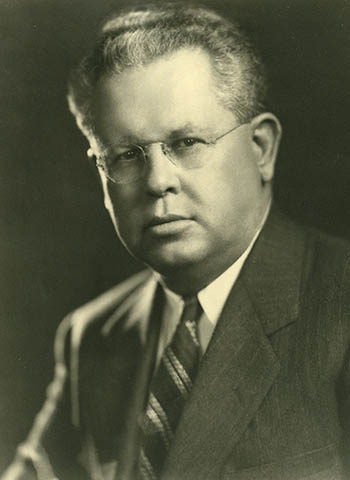Our series on Colorado’s governors continues with Ralph L. Carr, Colorado’s 29th governor. Governor Carr served two terms from 1939-1943. As part of the State Publications Library’s effort to digitize governors’ addresses, Governor Carr’s 1939 and 1941 inaugural addresses and his 1941 message to the Colorado General Assembly are available in our digital collection.
Early Life
Ralph Carr was born in Rosita, Colorado in 1887 to a family of miners. He graduated from Cripple Creek High School and went on to the University of Colorado to work towards his undergraduate and law degrees. He finished his law degree in 1912, with a focus on water rights and interstate river law.

Along with law, Carr had an interest in journalism. He managed the Victor Daily Record from 1912-1913 and edited the Trinidad Evening Picketwire from 1915-1917.
Carr appreciated his rural mining background and returned to southern Colorado to open a law firm in Antonito. While his law practice mostly focused on water rights, Carr also developed a bond with the Hispano communities in the San Luis Valley and provided them with legal assistance when needed. He also had relationships with the small Japanese American community in nearby La Jara. Carr recognized that his time living in southern Colorado informed his lifelong belief in the value of cultural diversity.
Carr married Gretchen Fowler in 1913 and the couple adopted two children together. After Gretchen passed away in 1937, Carr married Eleanor Fairhall.
Political career
Carr’s career in government began when he was appointed as a county attorney of Conejos County. He later had a successful career as an assistant attorney general for the state, which led to his appointment as the United States Attorney for the District of Colorado. He gained notoriety in the legal field and was nominated as the Republican gubernatorial candidate in 1938. He won both his first and second elections by wide margins.
In his 1939 inauguration address, Carr focused on reducing government spending and bureaucracy in the era of New Deal reforms. This effort would define his first term as he worked with the General Assembly to pass the State Reorganization Act in 1941 intended to help the state government operate more efficiently. Carr brought his interest in water rights law to his gubernatorial role; in his second inaugural address, he advocated for Colorado to retain control of its waterways and irrigation rights over the federal government.
Carr’s second term was marked by the beginning of World War II and, most notably, his ardent opposition to the forced incarceration of Japanese Americans into camps like Amache, located in southeastern Colorado. He recognized the ethnic discrimination for what it was and refused engage in the anti-Japanese panic that swept the country. In a radio message delivered shortly after the Pearl Harbor attacks, Carr emphasized that someone’s dedication to their country should not hinge on, “the birthplace of his grandfathers,” pointing out that most Americans are descendants of immigrants. When the Amache camp opened, Carr defended arriving Japanese Americans from a violent mob and maintained correspondence with many of the camp’s inmates. His dedication to upholding the humanity of Japanese Americans is thought to have cost him his political career.
Life after politics
Carr ran for senator in 1942 but lost by a narrow margin. He died on September 22, 1950, and is commemorated through a statue in Denver’s Sakura Square, the Ralph Carr Memorial Highway, and the Ralph Carr Judicial Center, which houses the Colorado Supreme Court.
- Twenty years of building Safe Routes to Schools - August 22, 2025
- Colorado state parks: St. Vrain - August 8, 2025
- Peach production in Colorado - July 25, 2025